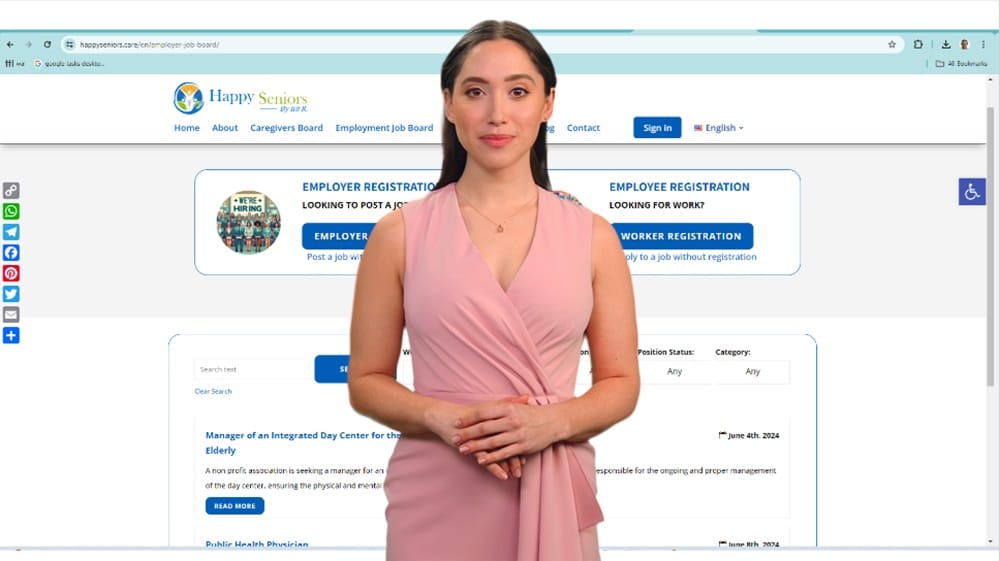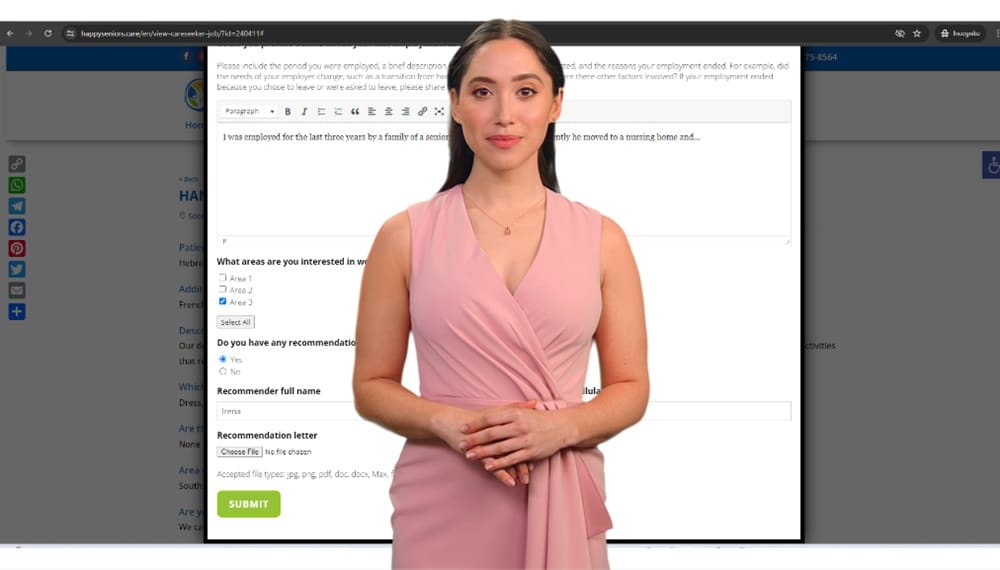
The Complete Guide to Hiring a Live-in Caregiver in Israel: Making the Right Choice for Your Family
Hiring a live-in caregiver from abroad (“foreign caregiver”) is a significant decision that can profoundly impact your family’s life. For families in Israel, this process involves unique cultural, legal, and logistical considerations. Our guide is specifically tailored to assist Israeli families considering hiring a live-in caregiver for their loved ones.
This guide is the first in a three-part series designed to assist you through each stage of this journey of hiring a Live-in caregiver:
- Initial Decision and Preparation: Understanding the need and preparing for Hiring a Live-in Caregiver.
- Recruitment Process: Finding, interviewing, and hiring the right caregiver.
- Maintenance and Support: Ensuring a successful long-term caregiving relationship.
Our aim is to provide practical advice while addressing the emotional and logistical challenges you may face during the initial decision-making process.
Key Insight: A successful caregiving arrangement isn’t just about finding someone to provide physical assistance—it’s about creating a supportive environment that enhances your loved one’s quality of life while providing peace of mind for the entire family.
Having the Conversation
Understanding Your Loved One’s Perspective
Approaching the conversation with empathy and clarity can make a significant difference in how your loved one receives the idea of a live-in caregiver. Here are specific strategies to facilitate a constructive dialogue:
- Express Your Limitations Compassionately Ans Stress Your Inability to Provide 24/7 Care: Gently explain that due to work commitments, caring for your own children, or other responsibilities, you are unable to be present around the clock.
- Example Script: “Dad, I wish I could be here with you all the time, but with my job and the kids needing my attention, I can’t provide the constant care you deserve.”
- Reassure Your Continued Support Promise That You Are Not Leaving Them: Emphasize that Hiring a Live-in Caregiver doesn’t mean you’re abandoning them. Assure them that you will continue to visit regularly and remain actively involved in their life.
- Example Script: “Having someone here to help doesn’t change how much I love you. I’ll still come by every day after work to spend time together.”
- Choose the Right Moment and Setting Find a calm, comfortable environment free from distractions to have the conversation. This could be during a quiet afternoon at home or while enjoying a favorite activity together.
- Express Empathy and Concern: Begin by expressing your love and desire for their well-being.
- Example Script: “Mom, your happiness and health are so important to me. I want to make sure you have all the support you need.”
- Highlight the Benefits: Emphasize how a caregiver can enhance their quality of life by assisting with daily tasks, providing companionship, and allowing them to continue enjoying their hobbies and routines.
- Example Script: “With some extra help around the house, you can spend more time doing the things you love without worrying about the harder tasks.”
- Involve Them in the Decision-Making Process: Encourage their participation in selecting the caregiver to ensure they feel included and respected.
- Example Script: “Let’s look at some caregiver profiles together and see who might be a good fit for you.”
- Share Personal Stories and Positive Examples: Relate experiences of friends or relatives who have had positive outcomes with live-in caregivers.
- Example: “Remember Aunt Leah? She was hesitant at first, but now she and her caregiver have become close friends.”
- Offer a Trial Period: Suggest starting with a short-term arrangement to see how it works, reducing the pressure of a long-term commitment.
- Example Script: “What if we try having someone help out for a few weeks and see how you feel about it?”
- Address Communication and Cultural Concerns: Reassure them that many caregivers are eager to learn Hebrew and that you can help bridge any language or cultural gaps together.
- Example Script: “We can find someone who is learning Hebrew, and we’ll all work together to make communication easy.”
- Acknowledge Their Fears and Listen Actively: Allow them to express their concerns without interruption. Validate their feelings by acknowledging their fears and showing understanding.
- Example Script: “I understand that this is a big change, and it’s okay to feel unsure. Let’s talk about what’s worrying you.”
Key Insights:
- It’s a Process, Not a One-Time Conversation: Recognize that accepting the need for a live-in caregiver is a significant change for your loved one. They may need time to process the idea, so be prepared for multiple discussions over days or even weeks. Patience is essential as they adjust to the new reality.
- Let the Idea “Cook”: Introduce the concept gently and allow your loved one time to reflect on it. Rushing the decision may lead to resistance. By giving them space, you’re showing respect for their autonomy and helping them come to terms with the change at their own pace.
By employing these strategies and understanding that this conversation may unfold over time, you can create a supportive environment where your loved one feels heard, respected, and involved in the decision-making process. This thoughtful approach paves the way for a smoother transition to having a live-in caregiver.
Understanding Your Care Options
Now that you’ve begun the conversation with your loved one and are giving them time to adjust to the idea of additional support, it’s important to explore all the care options available. Understanding these options will help you make an informed decision that best suits your loved one’s needs and preferences, as well as the family’s capabilities.
Key Decision Point: While several care options exist, hiring a live-in caregiver from abroad can offer a comprehensive solution for seniors requiring round-the-clock care while maintaining their home environment. By evaluating all available options, you can determine whether this choice aligns with your loved one’s needs and your family’s circumstances.
Overview of Care Options
- Family Caregiving
- Israeli Part-Time Caregivers
- Nursing Homes
- Live-in Caregiver from Abroad
Let’s delve into each option to understand their advantages and challenges.
1. Family Caregiving
Advantages:
- Emotional Comfort: Care is provided by loved ones who have a deep understanding of the senior’s preferences and habits.
- No Language or Cultural Barriers: Communication is seamless, and cultural practices are shared.
- Cost Savings: Financial expenses are minimized compared to Hiring a Live-in Caregiver professional.
Challenges:
- Physical and Emotional Burnout: Family members may experience stress and fatigue, affecting their health and relationships.
- Impact on Personal Lives: Balancing caregiving with work, raising children, and other responsibilities can be overwhelming.
- Lack of Professional Training: Family members may not have the necessary skills to handle medical or specialized care needs.
- Unsustainable Long-Term: Providing 24/7 care can become impractical over time.
2. Israeli Part-Time Caregivers
Advantages:
- Professional Assistance: Caregivers are trained and experienced in providing elder care.
- Cultural Familiarity: Shared language and cultural practices ease communication and understanding.
- Flexible Hours: Care can be scheduled according to specific needs.
Challenges:
- High Cost: Hourly rates can accumulate quickly, making it an expensive option for extensive care.
- Limited Availability: Scheduling conflicts may arise, leading to coverage gaps.
- Multiple Caregivers: May require coordinating with more than one caregiver to cover all needed hours, leading to inconsistency.
3. Nursing Homes
Advantages:
- Comprehensive Care: Access to 24/7 medical supervision and assistance.
- Structured Environment: Provides routines and activities designed for seniors.
- Social Interaction: Opportunities to engage with other residents.
Challenges:
- Loss of Familiar Environment: Moving away from home can be distressing.
- Less Personalized Attention: Staff may have limited time for one-on-one interaction.
- High Cost: Often the most expensive option.
- Emotional Impact: Feelings of abandonment or isolation may occur.
4.Hiring a Live-in Caregiver from Abroad
Advantages:
- Aging in Place: Allows your loved one to stay in the comfort of their own home.
- Consistent Care: One caregiver provides continuous support, fostering a strong relationship.
- Cost-Effective for 24/7 Care: More affordable than round-the-clock hourly care.
- Personalized Assistance: Care can be tailored to the senior’s specific needs and routines.
- Cultural Enrichment: Opportunity for mutual cultural exchange and learning.
Challenges:
- Language and Cultural Adaptation: Initial communication barriers may exist, requiring patience and effort from both parties.
- Living Space Requirements: Accommodations must be made in the home for the caregiver.
- Employment Management: Legal responsibilities as an employer, including contracts and adherence to labor laws.
- Adjustment Period: Time needed for both the caregiver and senior to adapt to each other.
Care Options Comparison Table
| Care Option | Best For | Cost Level | Level of Care | Impact on Senior’s Life | Family Involvement Required |
|---|---|---|---|---|---|
| Family Caregiving | Short-term or partial care needs | Low financial cost, high personal cost | Variable, limited by availability | Minimal disruption to routine | Very High – significant commitment |
| Israeli Part-Time Caregivers | Independent seniors needing specific-time assistance | High hourly cost | Professional but time-limited | Moderate adjustment needed | Moderate – scheduling and oversight |
| Nursing Home | Complex medical needs requiring constant supervision | Highest | Comprehensive medical care | Complete lifestyle change | Low – mainly administrative |
| Hiring Live-in Caregiver from Abroad | Long-term comprehensive care at home | Moderate-High, cost-effective for 24/7 care | Comprehensive personal care | Maintains home environment with adaptation | Moderate – management and support |
Key Insight: Each care option has its unique benefits and challenges. It’s essential to weigh these factors against your loved one’s needs, preferences, and the family’s capacity to provide support. Openly discussing these options with your loved one can help them feel involved and respected in the decision-making process.
Transitioning to the Preferred Option
After reviewing all options, you might find that hiring a live-in caregiver from abroad offers the best balance of comprehensive care and maintaining your loved one’s quality of life. Involving your loved one in this evaluation reinforces their autonomy and can ease the transition.
In the next section, we’ll explore how to find the right caregiver, ensuring a successful match that meets both your loved one’s needs and the caregiver’s abilities.
Finding the Right Caregiver
Selecting the right caregiver is not just a step in the process—it’s the cornerstone upon which the entire caregiving experience is built. This decision will significantly impact your loved one’s quality of life, your family’s peace of mind, and the overall success of the care arrangement. The caregiver you choose will become an integral part of your loved one’s daily routine, providing not only physical assistance but also emotional support and companionship. Therefore, finding the right match is absolutely crucial.
A well-matched caregiver can enhance your loved one’s well-being, foster a positive relationship, and ensure a smooth integration into your family life. Conversely, a poor match can lead to discomfort, stress, and the disruption of care, necessitating the arduous process of finding a replacement. The stakes are high, and careful consideration is essential.
Exploring Caregiver Source Options
When searching for a live-in caregiver, you generally have two primary options:
- Bringing a New Caregiver from Abroad
- Hiring an Experienced Caregiver Already in Israel
Each option has its advantages and challenges. Understanding these can help you make an informed decision that best suits your loved one’s needs.
Caregiver Source Options Comparison
| Aspect | New Caregiver from Abroad | Experienced Caregiver in Israel |
|---|---|---|
| Initial Cost | Higher (visa, travel, agency fees) | Lower (local transfer fees) |
| Experience Level | Limited/None in Israeli context | Proven track record locally |
| Adaptation Period | Longer (3-6 months) | Shorter (1-2 months) |
| Flexibility | Generally more adaptable | May have set working styles |
| Salary Expectations | Initially lower | Generally higher |
| Risk Level | Higher (unknown performance) | Lower (verifiable references) |
| Language Skills | Usually minimal Hebrew | Basic Hebrew common |
| Cultural Understanding | Limited | Established |
Detailed Analysis of Each Option
1. Bringing a New Caregiver from Abroad
Best When:
- Your loved one is still relatively independent and can participate in the adaptation process.
- The family has time to invest in training and helping the caregiver adjust.
- Lower ongoing costs are a priority.
- You desire a caregiver who can grow into the role and potentially stay long-term.
- Flexibility and adaptability are valued over immediate experience.
Considerations:
- Adaptation Period: Expect a longer adjustment phase as the caregiver acclimates to a new country, culture, and your family’s routines.
- Training Needs: Additional time and effort will be required to train the caregiver in specific care tasks and household expectations.
- Language Barrier: Communication may be challenging initially; patience and support will be necessary.
- Unknown Performance: Without prior experience in Israel, assessing their capabilities relies on overseas references and interviews.
Advantages:
- Flexibility: New caregivers may be more open to adapting to your loved one’s specific needs and preferences.
- Long-Term Potential: They may be more likely to commit to a longer stay, providing continuity of care.
- Cost Savings Over Time: While initial costs are higher, ongoing salary expectations may be lower.
2. Hiring an Experienced Caregiver in Israel
Best When:
- Immediate skilled care is required due to complex medical needs.
- Quick adaptation is necessary, and there’s less time available for training.
- Communication in Hebrew is important for your loved one’s comfort.
- You prefer a caregiver with a proven track record and verifiable local references.
Considerations:
- Higher Salary Expectations: Experienced caregivers may command higher wages due to their expertise.
- Established Work Habits: They may have set ways of working, which could require negotiation to align with your family’s preferences.
- Availability: Finding an available experienced caregiver may be challenging due to demand.
- Shorter Commitment: They may prefer shorter contracts or have other obligations that limit long-term availability.
Advantages:
- Quick Integration: Familiarity with Israeli culture and systems allows for a smoother transition.
- Proven Skills: Their experience provides confidence in their ability to handle care responsibilities effectively.
- Language Proficiency: Better communication can enhance the relationship with your loved one.
Key Insights:
- Assess Your Priorities: Determine what factors are most important—be it immediate experience, cost considerations, long-term commitment, or adaptability.
- Involve Your Loved One: Their comfort and preferences should guide the decision, especially regarding language and personality fit.
- Consider Timing: If you have the luxury of time, bringing a caregiver from abroad might be feasible. If urgent care is needed, an experienced local caregiver may be the better option.
- Weigh Risks and Benefits:Each option carries its own risks and potential rewards. Balancing these against your family’s needs will help in making the right choice.
Finding the right caregiver goes beyond choosing between these two options. It’s about ensuring compatibility on multiple levels—physical needs, communication, cultural fit, and emotional connection. In the next section, we’ll delve into The Matching Process, where we’ll explore how to evaluate these factors in depth, conduct effective interviews, and utilize professional support to find the caregiver who is the best fit for your loved one and family.

The Matching Process in Hiring a Live-in Caregiver
Just as selecting the right caregiver is crucial, the matching process itself is where the foundation for a successful caregiving relationship is truly established. This stage isn’t merely about ticking boxes on a checklist; it’s about finding a caregiver whose skills, personality, and values align seamlessly with your loved one’s needs and preferences. A thoughtful and thorough matching process can significantly enhance the quality of care and the overall experience for everyone involved.
Why It Matters: Even the most qualified caregiver may not be the right fit if there’s a mismatch in personality, communication style, or cultural understanding. A poor match can lead to discomfort, misunderstandings, and ultimately, a breakdown in the caregiving relationship. This not only affects your loved one’s well-being but also results in additional stress and potential financial costs for the family as the search begins anew. Investing time and effort in this process helps prevent future issues, promotes harmony, and contributes to the overall success of the care arrangement.
Key Considerations
When matching a caregiver to your loved one, consider the following areas:
- Physical and Medical Needs
Factor Considerations Health Conditions Dementia, Parkinson’s, diabetes, dialysis requirements, or other illnesses requiring specialized care Mobility Level Ability to walk independently, use of wheelchair or mobility aids, need for transfers between bed and chair Continence Care Assistance with toileting, use of diapers, ability to control bladder and bowel movements Daily Activities Tasks the senior can perform independently vs. those needing assistance (e.g., bathing, dressing, eating) Left Alone Whether the senior can be safely left alone for short periods or requires constant supervision Mental State Cognitive abilities, memory issues, mood disorders, need for mental stimulation or companionship - Lifestyle and Habits
Factor Considerations Living Situation Whether the senior lives alone, with a spouse, family member, or has pets in the home Smoking Habits If the senior or caregiver smokes, and if this affects compatibility Dietary Preferences Special diets, food restrictions, kosher kitchen requirements Sleep Patterns Senior’s sleep schedule, need for nighttime assistance Hygiene Practices Bathing frequency, grooming preferences Religious Observance Sabbath observance, holiday practices, need for caregiver to respect or participate - Communication and Cultural Compatibility
Factor Considerations Language Skills Need for Hebrew, English, or other language proficiency Cultural Sensitivity Understanding and respecting cultural norms and practices Communication Style Preferences for formal or informal interaction, patience, clarity - Family Expectations and Caregiver Understanding
Factor Considerations Task Expectations Clarity on tasks the caregiver is expected to perform (e.g., cooking, cleaning, medical assistance) Caregiver’s Experience Previous experience with specific conditions (e.g., dementia, Parkinson’s) Boundaries Defining personal space, privacy, and professional boundaries Flexibility Ability to adapt to changing needs or schedules
Steps in the Matching Process when Hiring a Live-in Caregiver
- Assess Needs Thoroughly
- Document all physical, medical, and emotional needs of the senior.
- Note any specific skills required, such as experience with certain medical equipment or conditions.
- Define Caregiver Criteria
- Create a detailed list of qualifications and personal attributes desired in a caregiver.
- Prioritize essential factors over those that are preferred but not critical.
- Screen and Interview Candidates
- Use reputable agencies to find candidates.
- Prepare questions that address all key considerations.
- Include the senior in interviews when possible.
- Evaluate Compatibility
- Observe interactions between the senior and caregiver.
- Ensure mutual understanding of expectations and responsibilities.
- Discuss lifestyle and habit compatibility.
- Check References and Background
- Verify experience, especially with relevant medical conditions.
- Conduct background checks for safety
Key Insights
- The Process Is More Than a Job Interview: You’re not just hiring an employee; you’re selecting someone who will be a daily companion and caregiver to your loved one. Trust is paramount, and the caregiver will become an integral part of your family’s life. The emotional and physical well-being of your loved one depends on this relationship.
- Invest in the Selection Process: Dedicate substantial time and resources to evaluate candidates thoroughly. Conduct in-depth interviews, observe interactions with your loved one, and perform comprehensive background and reference checks. This investment helps ensure safety, compatibility, and peace of mind.
- Professional Assistance Is Highly Recommended: Engaging a social worker or professional case manager can greatly enhance the matching process. These professionals bring expertise in assessing needs, understanding family dynamics, and evaluating caregiver qualifications. Their guidance can help you navigate complex considerations and make informed decisions.



